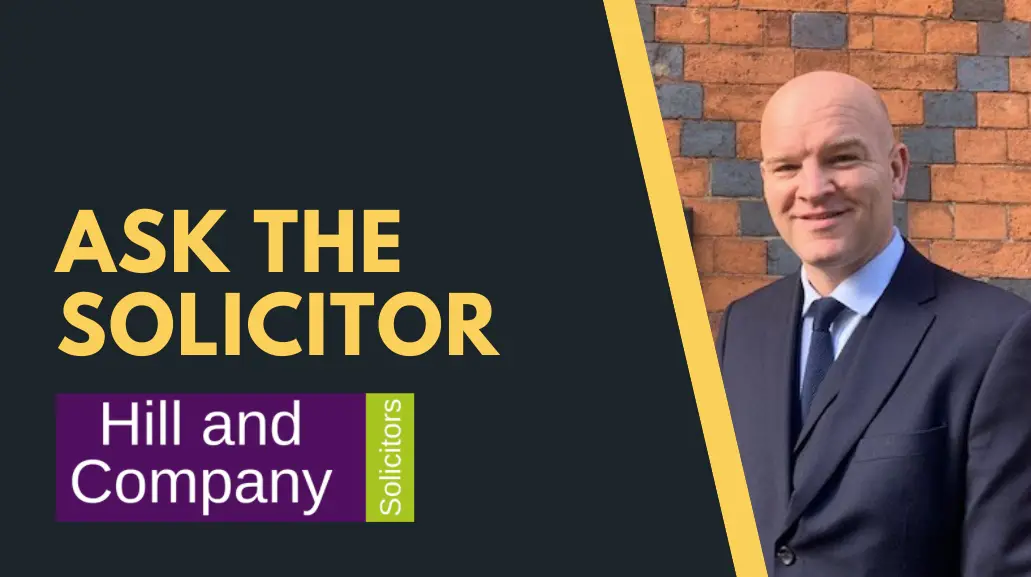Today we continue our series of legal advice articles called Ask the Solicitor, in partnership with Altrincham law firm Hill and Company. You can read the previous articles here.
Once again this week, it’s family solicitor Dan Knox.
Q
Dear Dan,
My husband is extremely controlling and doesn’t like me going anywhere without his permission. Our relationship never used to be like this but over the years, my husband has become more and more paranoid and to try and stop any arguments, I would try and comply as much as possible with his demands so that he wouldn’t get angry, so that we could have a happier life. As a result of this, I no longer speak with members of my family as my husband said that they were not supportive enough of our relationship.
I do not have access to any of our bank accounts. I have a card that my husband transfers money to for any purchases I need to make.
His paranoid behaviour has recently become worse, and my husband will tell me that he doesn’t like what I wear as he thinks I am dressing to try and attract other men. Again to avoid any arguments, when he gets like this, I change my clothes before leaving the house and now no longer wear any tight fitting clothing.
The situation has drained me emotionally and physically. I have come to the realisation that I cannot keep living like this and I want to leave my husband, but I am very scared of what his reaction will be, and I do not have access to any money which makes leaving more difficult.
Is there anything I can do?
Thanks, Susan
A
Dear Susan,
Firstly, reaching out for help is the first (and very important) step and we commend you for being brave enough to open up about the difficulties you have faced.
There is a common misconception that abuse only relates to physical altercations. This is not the case. Coercive behaviour, such as the controlling behaviour your husband has displayed, is considered by the court as abuse.
Although there is no legal definition, coercive control is commonly described as the need for total emotional control over a partner. This can be achieved by a combination of subtle tactics which often increase over time, they can incude: monitoring a person’s time and communication; isolating that person from friends and family; controlling a person’s day to day activities, what they eat, wear and where they are allowed to go etc.; controlling their money; and degrading and humiliating the person repeatedly.
Based on your email, it appears that you have been and are still a victim of abuse. We would urge you in the first instance to reach out to the domestic abuse charities and support providers in your area.
There are organisations in your area who can support you, provide you options and facilitate you with a space to make the right decisions. We would urge you to contact one of the many domestic abuse helplines and your GP and they will help to provide you with the support you need to ensure that you are safe.
Realising that you are a victim of abuse, is the first stage in allowing yourself to get the help you need and we will be here for you throughout this difficult journey. You have now taken this, the most difficult step.
From a legal standpoint, if you are scared as to what your Husband would do if you tried to leave, you could consider obtaining a non-molestation order which can be obtained without notice to your husband (meaning that he will not know that the order is in place until it has already been made). This order would likely prevent him from contacting you directly, or coming close to your home and work.
Of course, we understand that as you do not have access to your bank accounts, the cost of separation will be a concern for you. There are many steps that you can take to mitigate your current circumstances, but the absolute priority is that you feel safe and that you put in place a network of support to allow you the freedom to make some positive decisions about your current circumstances.
Please contact us directly at client.services@hillandcompany.co.uk or call us directly on 0161 928 3201 so we can begin to put the support you need in place today.
Useful contact numbers for those who may be affected by any issue raised within this article:
- National Domestic Violence Helpline – 0808 2000 247
- Victim Support free 24 hour Helpline – 0808 1689 111
- The Men’s Advice Line, for male domestic abuse survivors – 0808 801 0327
- The Mix, free information and support for under 25s in the UK – 0808 808 4994
- National LGBT+ Domestic Abuse Helpline – 0800 999 5428
- Bright Sky App – available on App Store and Google Play
If you would like any more information in relation to domestic abuse, or any other legal issue, you can contact Dan or one of our other trusted legal advisors here at Hill and Company by telephone on 0161 928 3201.






